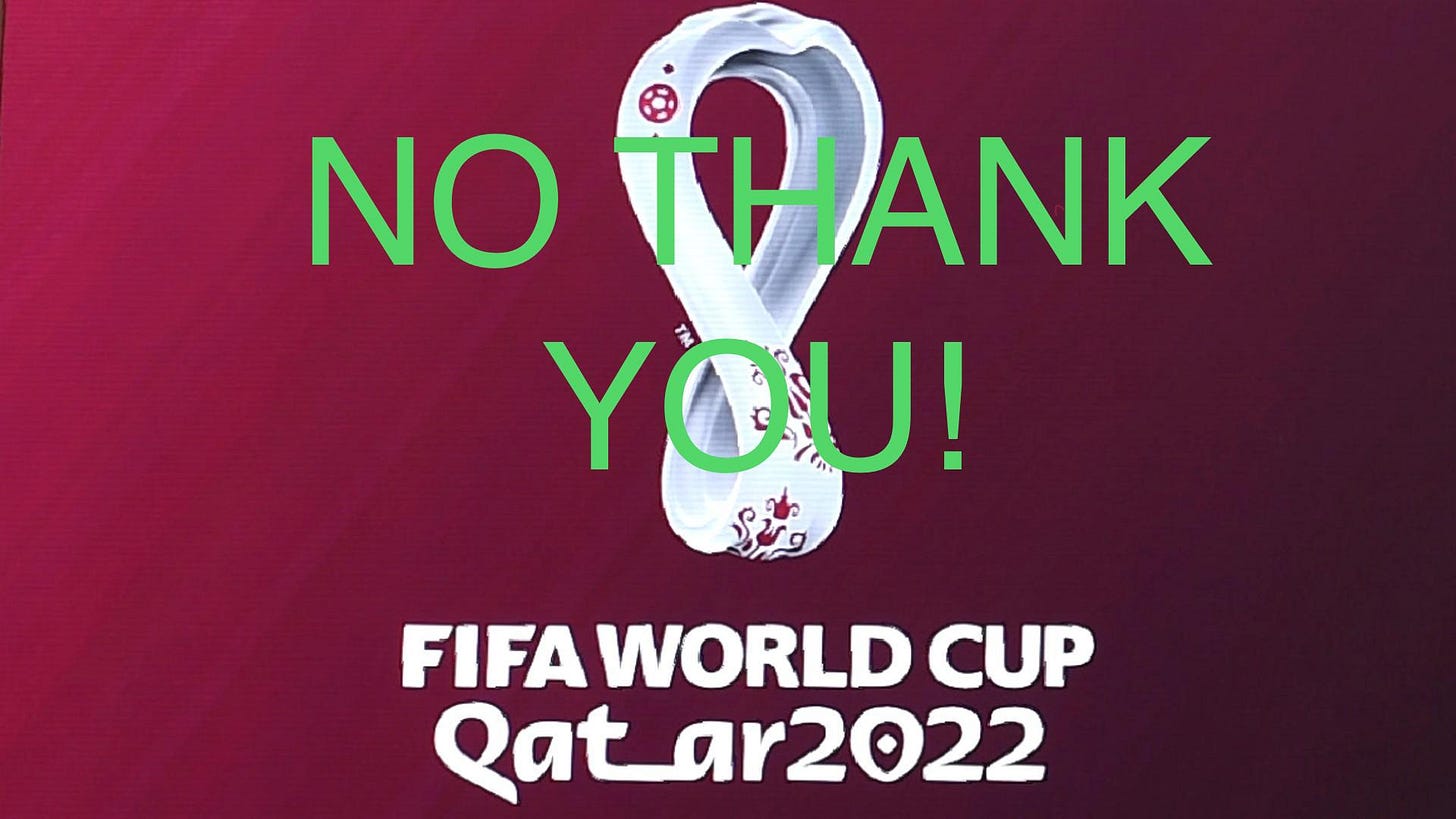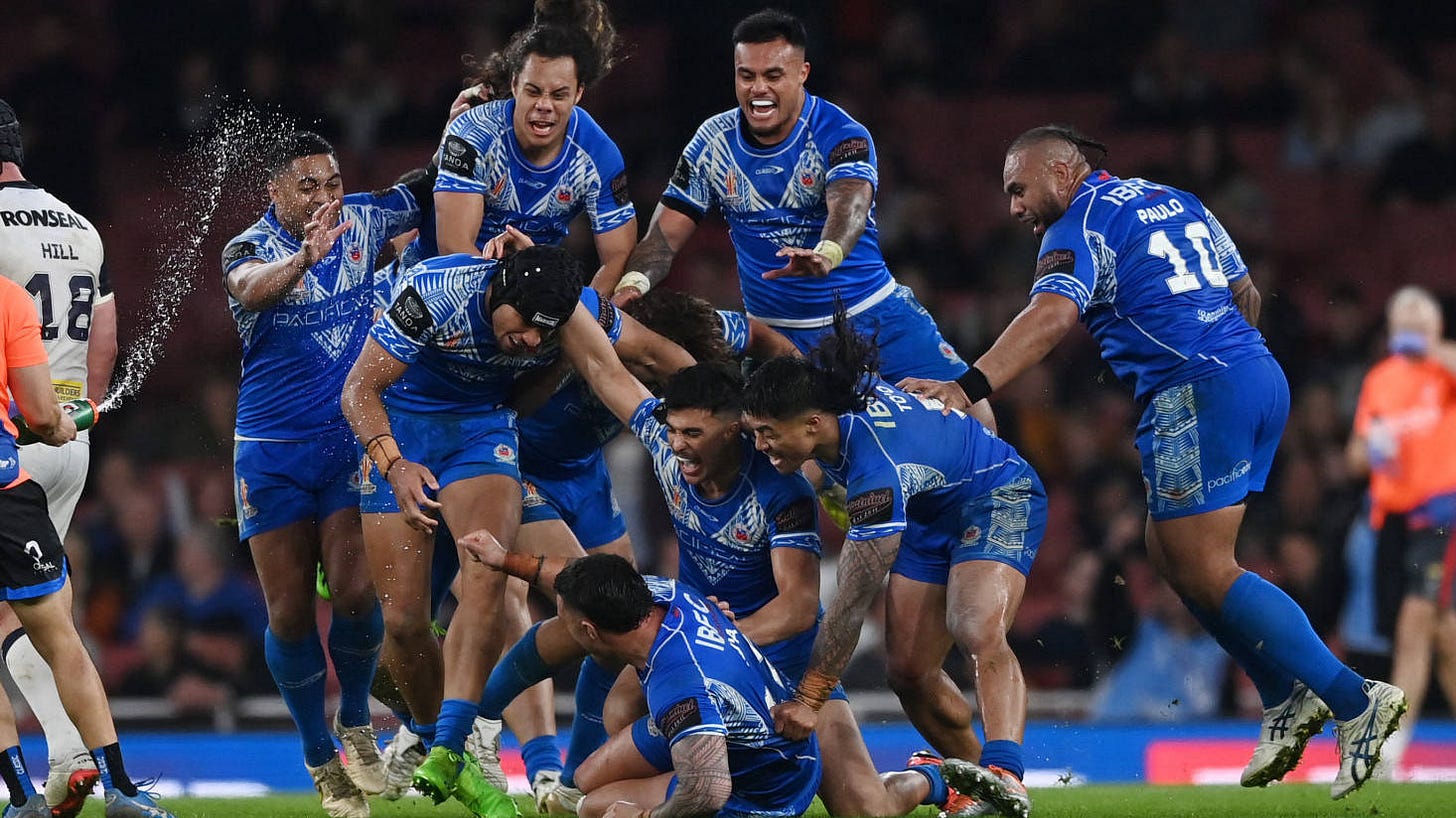Forty-three days without the Premier League. Three days in and already I’m suffering withdrawal symptoms. Yes, I knew it was coming. And having watched athletics three times in Doha I’ve no intention now of jumping on the hypocrisy train. I do though expect club football across the globe to be the big winner from the decision to stage the World Cup at the start of the northern hemisphere winter. Absence will make our hearts grow even fonder.
FIFA’s marquee product is going to be a poor substitute for our habitual football at this time of year. The Times has flagged Crawley Town v Gillingham as the first ever professional game in England to coincide with a World Cup finals fixture. The Broadfield Stadium on Tuesday sounds a more appealing prospect than watching France v Australia from my sofa, especially as the crypto club has recently climbed off the bottom of League Two. I’ll report back next week.
Many top flight clubs will be plotting a mid-season reset during this enforced break. None could be more dramatic than the search for new investors - possibly outright owners - at Liverpool FC. The media is mooting a valuation for the club of around £4 billion, 60% higher than the base price paid for Chelsea by Todd Boehly and his crew.
Forbes football club valuations (April 2021): #1 Real Madrid $5.1bn, #2 Barcelona $5.0bn, #3 Man Utd $4.6bn, #4 Liverpool $4.5bn, #5 Bayern Munich $4.3bn, #6 Man City $4.3bn, #7 PSG $3.2bn, #8 Chelsea $3.1bn, #9 Juventus $2.5bn, #10 Spurs $2.4bn
Whether or not a transaction eventually occurs, the process initiated by Fenway Sports Group highlights once again the difficulties involved in monetising a stake in a football club. The Glazer family are derided for taking hefty annual dividends out of Manchester United - around £30m last year alone - but they are unabashedly making their investment work for them. Other owners are dependent on selling as their means of turning notional paper returns into real ones.
It may be that the injection of new funds at Liverpool in return for only a minority share stake beside FSG is the route the club’s owners pursue. This would be a classic private equity industry ploy. Whatever valuation a new shareholder comes onto the club’s register at would set a level for FSG to declare to its own investors. In that way FSG finds money for, say, a Jude Bellingham, still retains its own shares, and demonstrates the success of its investment to itself and its backers.
Of course, this ‘mark to market’ approach relies on the football industry merry-go-round continuing to spin - or, cynically, the greater fool theory holding. The investment world is littered with businesses whose high notional valuations based on small minority share sales are subsequently shown to be grossly overblown.
The hotly contested pursuit of Chelsea back in the spring could have sowed the seed for FSG. The leading contenders in that process were American. AFC Bournemouth is currently moving into the hands of a Texan who owns the Vegas Golden Knights ice hockey franchise, while the 49ers Enterprises group is expected to take majority control at Leeds United soon. There will be talk of Chinese and Middle Eastern money for Liverpool, but it seems the strong dollar, US sport valuation metrics and simple investment fashion are likely to mean Americans remain the principal players in town.
Potential investors might first like to ask Todd Boehly how he’s found his first five months at Chelsea though.
Black, red, silver-lining
I didn’t think there could be a better sporting event this year than the intense drama of the Black Ferns’ triumph over the Red Roses in the women’s Rugby World Cup; and then came Samoa’s extra time golden drop-goal win against England in the Rugby League World Cup semi-final only hours later. Pointless to try and choose between them really.
Two defeats for England across different rugby codes and genders, both times when they started as favourites. Hard though it is to say it, the result in Eden Park may well prove to be best for the greater cause of women’s rugby union. England’s team has been funded to be fully professionally for the past three years in pursuit of the World Cup. New Zealand belated recognised the threat this posed and hurriedly upped the financial backing for their squad - spurred by the knowledge they were hosting the tournament.
Other nations must now find the wherewithal if they want to be able to compete. Only three or four of the countries in this RWC could have had any realistic hope of success. Expect more in three years time in the 2025 edition, which as it is in England will make the ticket-selling narrative of revenge for Saturday’s narrow defeat all the more compelling. I can’t imagine there will be any unsold seats at Twickenham for the final, whoever contests it.
My man in the stands at the Emirates for the Rugby League World Cup semi bemoaned England’s “totally self-inflicted defeat”. He’s a southerner with a very long-standing preference for league over union and absolutely knows what he’s talking about. For me as a novice viewer, forget the errors: the exhilarating spectacle was all.
Arsenal’s ground was two thirds full; Elland Road at three quarters capacity for the other semi final the night before. This seems an apt metaphor for the RLWC as a whole. Too long, too few truly competitive matches, but suddenly compelling at the sharp end. A six or seven out of ten event. Extra marks on top for running the women’s, disability and wheelchair tournaments alongside the men’s.
Organisers will be hoping that the lack of home representation in the final doesn’t deplete the crowd. They will certainly struggle for media cut-through up against the start of the FIFA World Cup. Super League Grand Final attendances at Old Trafford have slipped in recent times, numbering 60,783 this year. This must be the yardstick against which Australia v Samoa will be measured in the same stadium on Saturday.
Both World Rugby and the IRL would do well to look at the formats of these two world cups with the objective of tightening them up while they work to boost the competitiveness of the weaker teams. Player safety obviously mitigates against playing twice a week, so they may need to take the bold step of having fewer nations playing in a top round-robin division rather than the conventional group-then-knockout structures currently deployed. Repeated trouncings don’t make for a great product.
Instead, World Rugby has increased the number of nations at the women’s 2025 RWC from 12 to 16.
Sting in the tail
It’s all very well wanting to pump-prime women’s sport, but you need the hard cash to do so. The demise of Wasps rugby has dragged under the netball team operating under the same brand and corporate umbrella. England Netball has been forced to scratch the club from its Netball Super League. The administrator’s statement couldn’t be clearer:
“We’ve worked tirelessly with the Netball Super League and England Netball in an effort to find a solution that would allow Wasps Netball to move forward… Despite all of our best efforts and interest from a number of parties, it has, regrettably, not been possible to find a solution in the time available.”
Song remains the same
Event presentation teams have a standard playlist of retro stings that you hear repeated across sports. Heaven for an old headbanger like me, but short on imagination. I did smile though when the unmistakable riff of Led Zep’s Kashmir belted out across the MCG straight after Ben Stokes bagged the wicket of Pakistan’s Iftikhar Ahmed in Sunday’s T20 World Cup final. A man in the PA room with a cheeky sense of humour.
Crypto airbrush
Just for a brief moment FTX flashed up at the bottom of my screen during the T20 final. The ICC hadn’t managed to airbrush out its collapsed cryptocurrency partner entirely after the semis. That still left 20 partners of the World Cup to rotate around the ground and on viewers’ screens. These bore testimony to the Indian consumer as the driving force behind global cricket, including upstox - a share trading platform that boasts “our mission is to bring prosperity to every Indian”. No India in the final, and hence far fewer eyeballs on the partner logos than had the team made it that far, but the match was a super high quality advert for the sport.





